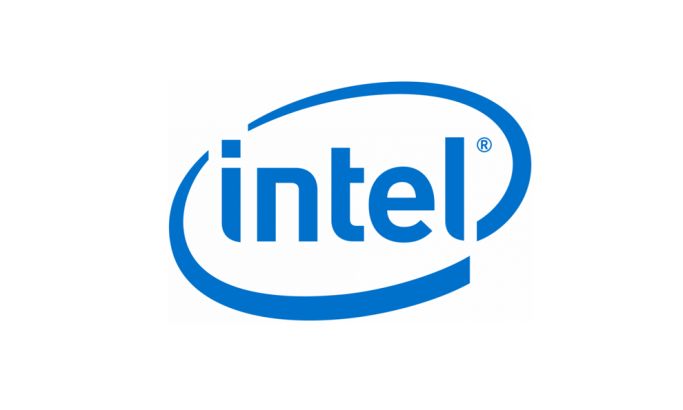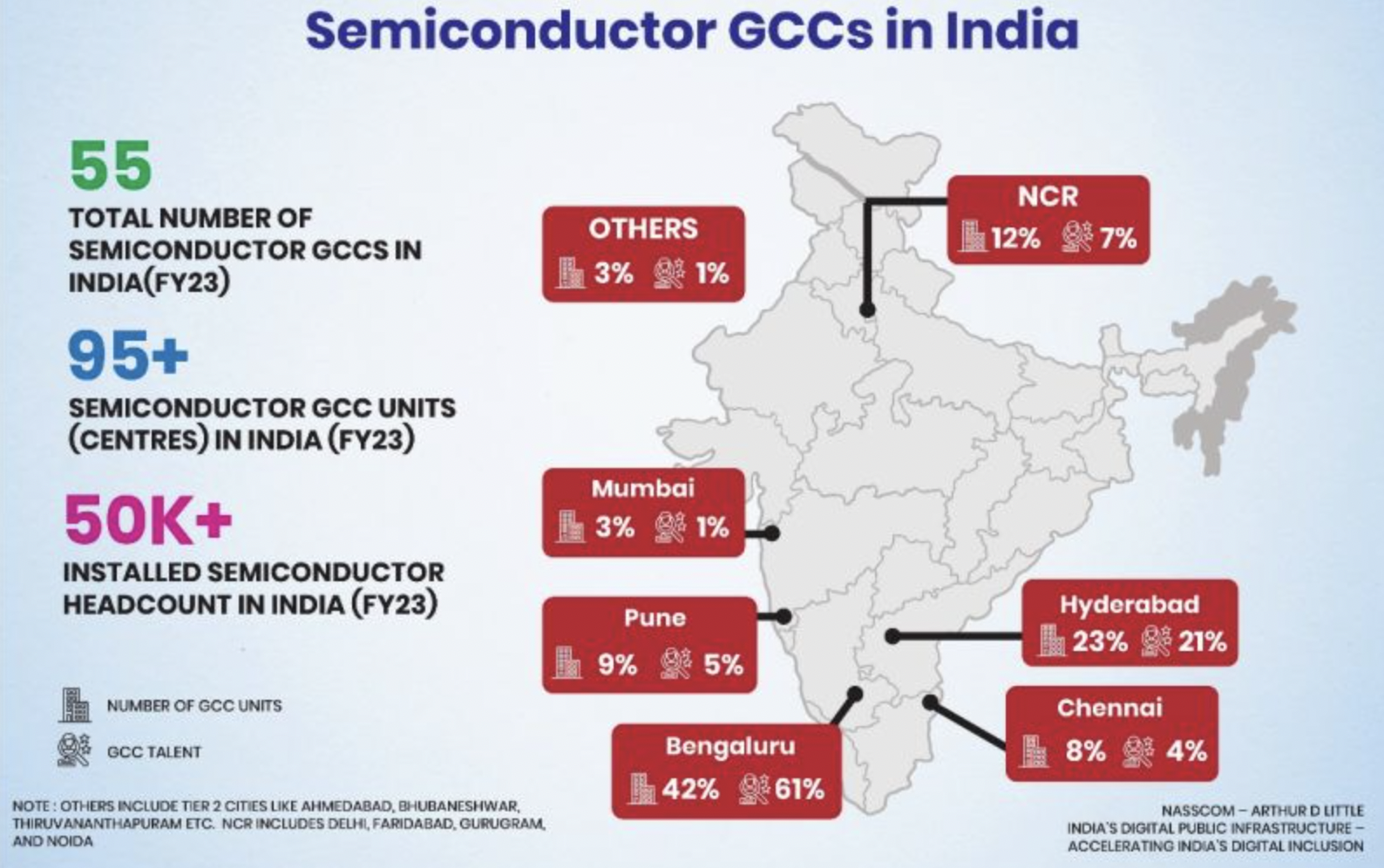Introduction
The semiconductor Global Capability Centers (GCCs) are on the rise in India, with around 30% of the new GCCs established in India during the fourth quarter of 2023 dedicated to the semiconductor sector.
This indicates a growing interest in utilizing local expertise for various aspects like front-end design, performance evaluation, and post-silicon validation.
Examining recent trends reveals that Bengaluru is leading in India’s semiconductor GCC landscape, hosting roughly 42% of all semiconductor GCC units and 61% of the GCC talent nationwide. Hyderabad comes next, with 23% of the total units and 21% of the talent.
Follow us on Linkedin for everything around Semiconductors & AI
What are GCCs?
GCC stands for Global Capability Center. Offshore units established by multinational corporations serve distinct purposes. They conduct activities like research and development, innovation, engineering services, IT, business process management, and specialized tasks. These units leverage global talent and resources to enhance efficiency and competitiveness. GCCs are established to leverage global talent, drive innovation, and enhance operational efficiencies.
Here are the top semiconductor units in India with GCCs
1. Signature IP

Signature IP, a US-based company founded in 2021, is dedicated to advancing network-on-chip (NoC) technology. As one of the emerging semiconductor players in India, Signature IP established a Global Capability Center (GCC) in October 2023.
The company expanded its presence with a new R&D center in Bhubaneswar. The center focuses on developing advanced NoC solutions. It aims to collaborate with local universities, research institutions, and semiconductor firms. The goal is to drive innovation and talent development in the NoC domain.
2. EdgeCortix

EdgeCortix, a fabless semiconductor company originating in Japan, specializes in crafting AI-specific processor architecture from scratch. As one of the recent participants in India’s semiconductor industry, EdgeCortix has launched a GCC in Hyderabad.
EdgeCortix focuses on AI-specific processor architecture and offers a comprehensive AI inference software development environment.
They provide adaptable edge AI inference IP and edge AI chips for various boards and systems. One notable offering is the Dynamic Neural Accelerator IP core.
It can scale from 1024 to 32768 MACs and boasts a significant 16x improvement in inference/sec/watt compared to GPUs.
3. M31 Technology Corporation

M31 Technology Corporation, originating from Taiwan, established an R&D design hub in Bengaluru in October 2023. This center concentrates on IP development, IC design, and EDA, encompassing memory compilers and standard library solutions.
Bengaluru serves as M31’s inaugural international spot for offshore R&D activities. The company has garnered TSMC’s Best IP Partner Award continuously for multiple years.
4. Micron Technology

Micron has earmarked $2.75 billion for constructing a semiconductor plant in Sanand, Gujarat. The facility will specialize in DRAM assembly and testing, as well as the creation of a 1 TB 232-Layer 3D TLC NAND Flash memory chip intended for various uses in both local and global markets.
Commencement of construction is planned for this year, with Phase 1, encompassing a 500,000 sq ft cleanroom, expected to be operational by late 2024. Phase 2, mirroring the scale of Phase 1, is set to commence in the latter part of the decade.
The initiative is anticipated to generate around 5,000 direct job opportunities at Micron and create 15,000 additional community jobs in the coming years. Furthermore, the project will receive 50% financial backing from the central government and an additional 20% support from the Gujarat government.
Read more Micron to Break Ground for Semiconductor Plant in India on 23rd – techovedas
5. AMD

AMD has recently opened its biggest global design center in Bengaluru and aims to hire approximately 3,000 engineers. The AMD Technostar campus covers an area of 500,000 square feet, with 60,000 square feet designated for R&D labs.
This establishment is a part of AMD’s $400 million investment in India spanning five years. The center’s primary focus will revolve around high-performance CPUs, GPUs, SoCs, and FPGAs
6. Intel

In India, Intel runs its Global Capability Center (GCC), housing crucial design and R&D centers pivotal in the company’s global semiconductor operations. Despite no chip manufacturing in India, Intel collaborates with prestigious academic institutions like IIT Bombay. For instance, Intel set up the Emsys Lab at IIT Bombay, emphasizing electronic and embedded system design, prototyping, and hardware-accelerated simulation.
Read more Intel Defines India as Separate Business Region: What Are the Implications – techovedas
7. Texas Instruments

Establishing its software design and R&D center in Bengaluru in 1985, Texas Instruments (TI) became the first multinational company to do so in India.
Over three decades, TI’s India center evolved into a key R&D hub, with engineers contributing to nearly every global product by TI.
In 2002, TI India expanded its focus to include designing 3G wireless chipsets and advancing Wireless LAN (WLAN) chipsets.
Additionally, in 2005, TI India partnered with Indian manufacturer BPL to develop the first cell phones tailored for the Indian market, using TI chipsets and reference designs.
In December 2010, TI established Kilby Labs in Bangalore, representing its initial international expansion of the research program beyond the US.
The labs concentrate on pioneering work in energy efficiency, bio-electronics, and life sciences, further reaffirming TI’s dedication to technological progress.
Read more Texas Instruments: Innovations which made the Modern World possible – techovedas
8. Nvidia

NVIDIA has set up four engineering hubs in India, including Bangalore and Delhi, with a collective employment of 4,000 engineers. This establishes India as the company’s second-largest talent pool, following the United States.
The company is actively partnering with prominent Indian firms like Reliance and the Tata Group to institute advanced AI data centers and computing infrastructure in India.
These AI data centers will harness NVIDIA’s next-generation GH200 Grace Hopper Superchip and DGX Cloud, an AI supercomputing service, to provide exceptional performance and convenient access to AI technology. Furthermore, Tata Communications and NVIDIA are collaborating on the development of an AI cloud in India, utilizing Tata’s global network to furnish vital infrastructure for the next era of computing and introduce AI capabilities to enterprises.
Read more 5 Ways NVIDIA’s AI is Revolutionizing Industries – techovedas
9. Qualcomm

Qualcomm has invested a substantial amount of Rs 177.27 crore to expand its footprint in Chennai through the establishment of a new design center. This facility is anticipated to generate job opportunities for around 1,600 professionals and play a vital role in propelling Qualcomm’s research and development initiatives in 5G technology globally.
With established engineering hubs in Bengaluru, Hyderabad, Chennai, and Delhi, Qualcomm has a workforce of 4,000 engineers in India, making it the second-largest talent pool for the company after the United States.
These Indian sites specialize in various fields such as wireless modem and multimedia software, DSP and embedded applications, and digital media networking solutions.
Read more How Well do you know Qualcomm- Take Our Quiz to Find out – techovedas
Conclusion
These GCCs play a vital role in leveraging local talent, driving cutting-edge research and development, and fostering collaboration with educational and research institutions. With India emerging as a formidable player in the semiconductor landscape, boasting robust talent pools and a conducive environment for technological advancements, the future of the semiconductor sector in India appears promising and poised for continued expansion.
Credits: Analytics India Magazine




